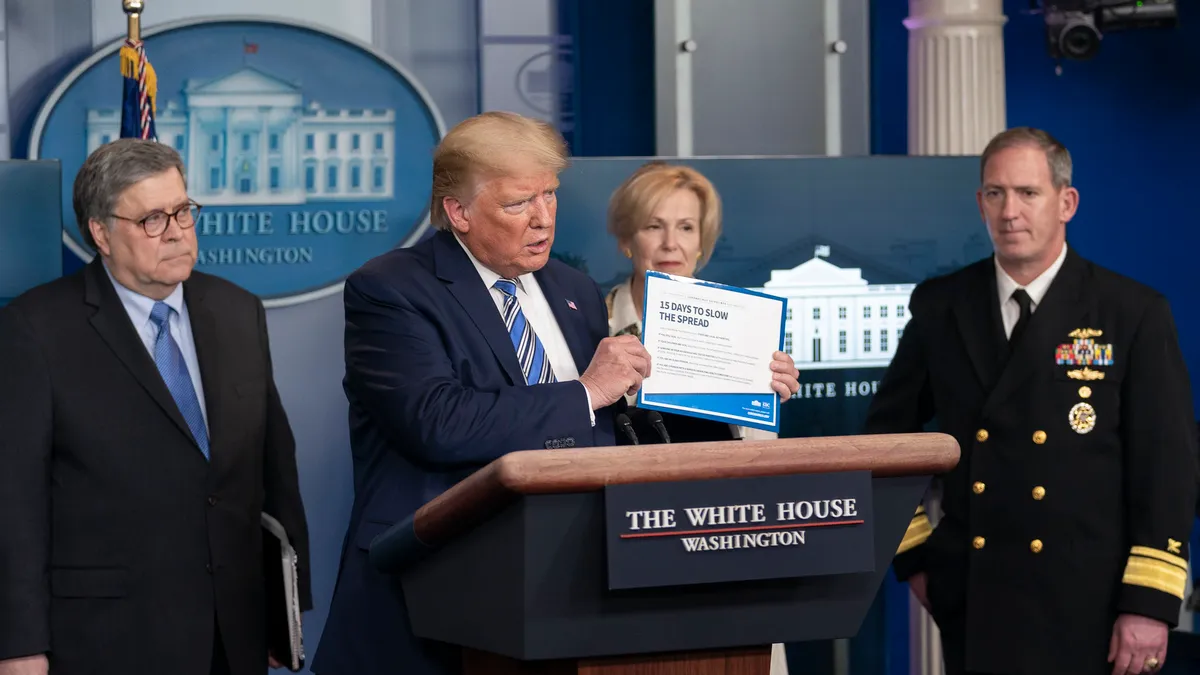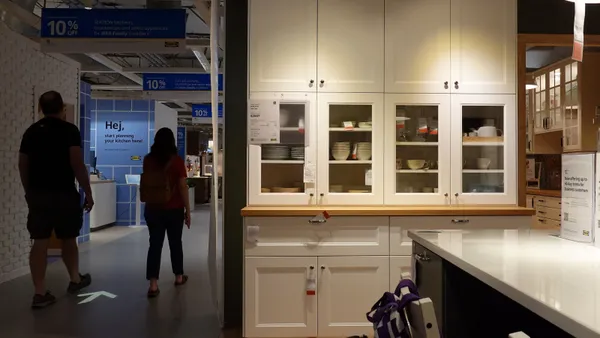Dive Brief:
- Under the rarely used Defense Production Act, President Donald Trump on Thursday issued an executive order meant to help U.S. ventilator manufacturers by removing "obstacles" blocking access to parts and materials needed to ramp up production in response to the coronavirus outbreak.
- Supply chain challenges are threatening rapid production of ventilators "needed to save American lives," Trump said during Thursday's White House briefing, citing GE, Hill-Rom, Medtronic, ResMed, Royal Philips, and Vyaire Medical as potential benefactors.
- Industry response has generally been positive. "Where the DPA may help is to make sure all of these companies continue to have access to the parts needed to build these devices as their production capacity grows," a Hill-Rom spokesperson told MedTech Dive.
Dive Insight:
The White House has put pressure on medtech companies to ramp up ventilator production to meet urgent medical needs as COVID-19 hospitalizations rise, but resisted invoking the DPA until last Friday. Now the administration is using the law to increase manufacturing capacity within the supply chain.
Trump said he directed the government to "use any and all available authority under the Defense Production Act to ensure that domestic manufacturers have the supplies they need to produce ventilators for patients with severe cases of COVID-19."
The DPA order comes as the administration is working to sign contracts with major ventilator manufacturers to meet its goal of delivering 100,000 additional systems over the next 100 days.
Adm. John Polowczyk, head of FEMA's new Supply Chain Stabilization Task Force, said Thursday that prior to the crisis, the U.S. "industrial base" produced about 30,000 ventilators annually but the administration hopes to significantly increase that number in the near term.
In particular, he said the administration's supply chain assistance under the DPA might take the form of rating orders in terms of priority and "helping them get ahead of others in that endeavor."
A Medtronic spokesperson said it's looking forward to HHS guidance on implementation. "Our preliminary assessment and understanding is the administration is working to ensure that ventilator manufacturers, such as Medtronic, have the necessary supplies we need to continue to increase our production of these critical products."
A spokesperson for ResMed told MedTech Dive the order "helps clear the road for us and other industry-leading ventilator manufacturers to get the parts, supplies, accessories, and logistical help we need to maximize our production efforts."
However, last week, AdvaMed CEO Scott Whitaker warned the use of the DPA could strain supply chains by forcing non-medical device manufacturers to retool their supply chains, siphoning critical parts away from medtech companies that have the existing expertise and capacity in place. Furthermore, he said, it could signal to other countries "that they should limit their own production and exports."
The DPA has the backing of the major healthcare provider groups, including the American Hospital Association, American Medical Association and American Nurses Association however, which sent a letter of support in March.
Trump said he anticipates "issuing more orders under the Defense Production Act in the very near future."
Under the DPA, the president can require companies to prioritize and accept contracts for materials and services to promote the national defense, as well as incentivize the domestic industrial base to expand the production and supply of critical materials and goods. Last Friday, he invoked the DPA to “compel General Motors to accept, perform, and prioritize federal contracts for ventilators.”
Without specifying, Trump on Thursday said he used "an element" of the DPA in a signed order "against 3M" which has been ramping up production of N95 respirators in response to the coronavirus pandemic.
The conglomerate said in a statement that it's "been working closely with the administration to do exactly that, and we appreciate the authorities in the DPA that provide a framework for us to expand even further the work we are doing in response to the global pandemic crisis."
At the same time, 3M rebuffed the administration's request that it stop exporting respirators it currently manufactures in the U.S. to Canada and Latin America, noting "significant humanitarian implications" of halting respirator supplies to healthcare workers there, saying it could backfire.
"Ceasing all export of respirators produced in the United States would likely cause other countries to retaliate," according to 3M. "If that were to occur, the net number of respirators being made available to the United States would actually decrease."
















